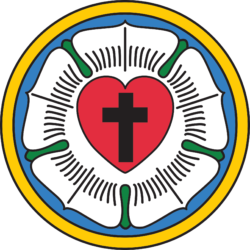Reading the Word of God, a daily Bible reading guide, has been prepared for Lutherans to use over the next three years.
The reading guide was conceived and prepared as a result of ongoing discussions between representatives of the NALC, the Lutheran Church— Canada (LCC), and the Lutheran Church—Missouri Synod (LCMS).
The reading guide includes monthly calendars with daily readings starting in January 2018 and continuing until December 2020. As a companion to the daily Bible reading guide, 52 suggested readings — one for each week of the year — are offered from the book, Luther and the Scriptures by Johann Michael Reu (1869–1943).
Reading the Word of God — the daily Bible reading guide and the monthly calendars — are available in three different formats:
- Reading The Word of God – Print Version & Traditional Calendar
- To receive a daily text message, please text: ReadingTheWord to 24251
- To receive a daily email, please please send an email with the subject line “Reading The Word of God” to [email protected]
- Calendar subscription to integrate into your current digital calendar: Google Calendar, Outlook (Office 365), iCal, etc. Calendar subscription link (paste into digital calendar): https://airtable.com/shroaqZI8ufceBDJx/iCal?timeZone=America%2FNew_York&userLocale=en
Unfamiliar with how to add a calendar subscription? Please feel free to access the following tutorials:
- Adding an iCal feed to an Apple Calendar: http://apple.co/2BLxjzm
- Adding an iCal feed to a Google Calendar: http://bit.ly/2aDk1qJ
- Adding an iCal feed to Microsoft Office: http://bit.ly/2Bh4xpk
Background Information –
Rue, a German-born American Lutheran theologian who taught at Wartburg Theological Seminary in Dubuque, Iowa, from 1899 until his death.
“During ongoing discussions between representatives of the Lutheran Church —Canada, the North American Lutheran Church and The Lutheran Church Missouri Synod, the participants agreed on two foundational matters. First, we came to a common understanding of the Holy Scriptures. In so doing, we adopted a document titled ‘God’s Word Forever Shall Abide: A Guiding Statement on the Character and Proper Use of the Sacred Scriptures’ (available online at www.thenalc.org/nalc-statements). That document has been circulated within our three church bodies to widespread approval. Second, we agreed that, to a great degree, the membership in each of our church bodies suffers from a declining familiarity with the Bible. We are reminded of the commendation of the Bereans, who ‘received the word with all eagerness, examining the Scriptures daily’ (Acts 17:11),” the document states.
“In order to encourage the people of our church bodies in the daily reading of Holy Scripture, we have compiled a three-year plan of daily Bible readings and a year-long series of weekly readings on Martin Luther’s approach to the Scriptures. … The plan provides a guide that will take the reader through the entire Old Testament one time in three years, with the exception of Psalms, which are read twice each year. The New Testament will be read twice in the three years. A reading from the Old Testament, a psalm (or portion of a psalm) and a reading from the New Testament is assigned for each day.”
“The suggested readings are offered for one reason only: to enhance devotional life as an individual or a family daily examines, and is examined by, the Word of God and then responds in prayer to the heavenly Father. … The most important purpose of the guide is to encourage a daily practice of reading and meditating on the Bible, God’s Word. Since the Scriptures as a whole are God’s Word, increasing familiarity with the various books is encouraged.”
“The translation of the Bible into the vernacular — into the everyday language of common people — was one of the greatest and most far-reaching accomplishments of the Reformation. As we celebrate the 500th anniversary of Luther posting the 95 Theses, we might also recall that following that event in the year 1517, other events ensured that the Reformation would leave a permanent mark on the Christian church. … But we also cannot omit Luther’s translation of the Bible into German, with his publication of the New Testament in 1522 and the entire Bible in 1534. The German Bible and the Catechisms enabled the Reformation to extend deeply into the mind and life of the laity,” the document states.



Would it be possible to get a text file of the three year plan so I can build the three year plan into LOGOS software?
Thanks
Great question! If you click on the bullet point in the first link, it should automatically redirect you to a place to download multiple files – the weekly readings and calendars. If that doesn’t work, please let us know!